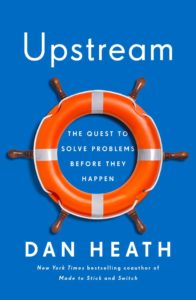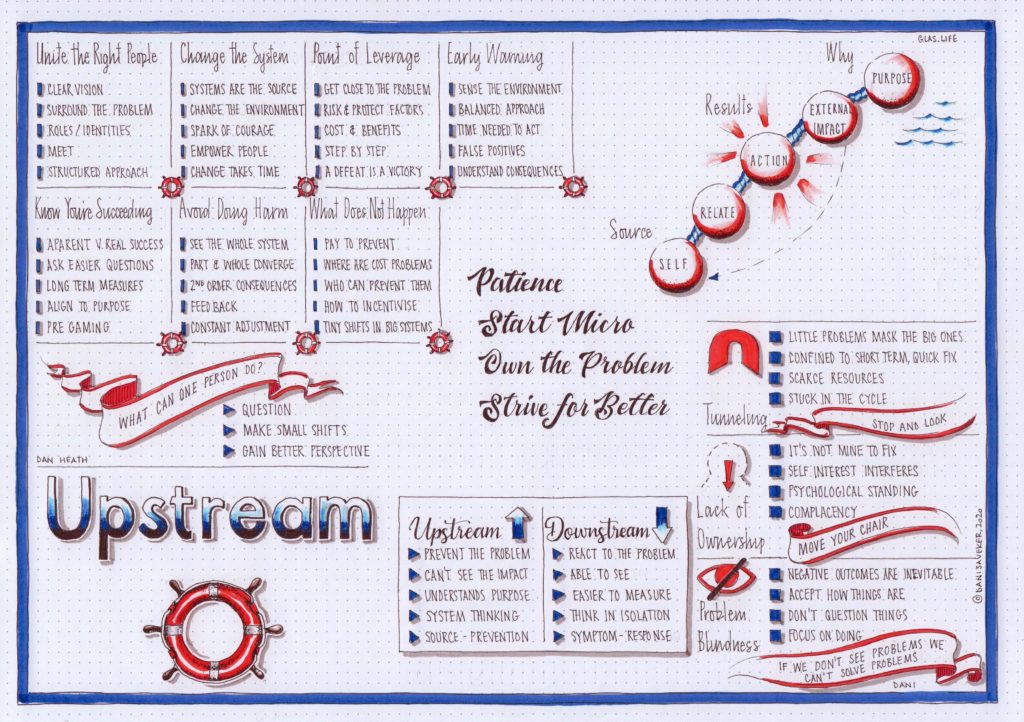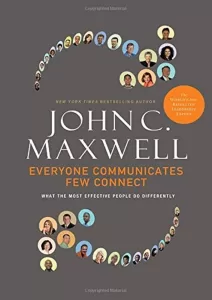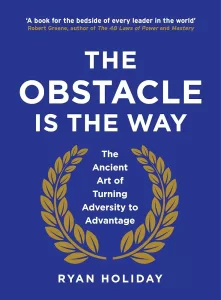Book Review: “Upstream”
Book: Upstream by Dan Heath
Reviewer: Bobby Powers
My Thoughts: 8 of 10
Dan Heath masterfully articulates the flaws in how we think about fixing problems versus preventing them. Just like all of Heath's books, this one is jam-packed with fascinating stories that explain each aspect of the problem along with ideas for how to shift our thinking further "upstream." Heath is one of the few writers who has earned the right for me to immediately fork over my dollars whenever another one of his books rolls off the printing press. This book is no exception.
What I Learned from the Book
Humans are horrible at long-term thinking. We invest heavily in fixing problems downstream (heart disease, crime, drug abuse, homelessness, etc.) while hardly spending anything to prevent those same problems upstream (investing in health, education, strong communities, etc.).
In fact, the US seems to be the worst perpetrator of this. According to Heath, "In the US, for every $1 spent downstream, we spend roughly $1 upstream." What do other countries spend? Roughly $2 upstream for each $1 downstream. That means we're investing HALF of what other countries invest in prevention. We need to get much better.
Selected Quotes and Ideas from the Book
Upstream vs. Downstream
- "Downstream actions react to problems once they've occurred. Upstream efforts aim to prevent those problems from happening."
- "When you spend years responding to problems, you can sometimes overlook the fact that you could be preventing them."
- Example: In 2012, Expedia realized that for every 100 customers who booked travel on their site, 58 customers called the Expedia customer service line afterward asking for help. The company's self-service model wasn't working, but no one realized it. The customer service team's success was gauged by metrics like service scores and call time. No one in the company was evaluated by how many people needed to call in for help.
- "The specialization inherent to organizations creates great efficiencies. But it also deters efforts to integrate in new, advantageous ways. In upstream ways."
- "Downstream work is easier to see. Easier to measure. There is a maddening ambiguity about upstream efforts."
- "Downstream efforts are narrow and fast and tangible. Upstream efforts are broader, slower, and hazier--but when they work, they really work. They can accomplish massive and long-lasting good."
- "What the world needs now is a quieter breed of hero, one actively fighting for a world in which rescues are no longer required."
The 3 Barriers to Upstream Thinking
- Problem Blindness - "I don't see the problem" or "This problem is inevitable"
- A Lack of Ownership - "The problem is not mine to fix"
- Tunneling - "I can't deal with that right now" (because I'm solving these other problems)
Why We Mistakenly Prioritize Downstream Thinking
- "What's odd about upstream work is that, despite the enormous stakes, it's often optional. With downstream activity--the rescues and responses and reactions--the work is demanded of us. A doctor can't opt out of a heart surgery; a day care worker can't opt out of a diaper change. By contrast, upstream work is chosen, not demanded."
- "'When we create organizations, we're doing it to give people focus. We're essentially giving them a license to be myopic.' [Quote from Expedia CEO Mark Okerstrom] Focus is both an enemy and an ally. It can accelerate work and make it more efficient, but it puts blinders on people."
- "In public health, if you do your job [keep people healthy], they cut your budget, because no one is getting sick." -Julie Pavlin, physician
- "We'll pay $40,000 a year for the price of insulin, but we won't pay $1,000 to prevent someone from ever getting diabetes." -Patrick Conway, former deputy administrator at CMS
Other Insights
- "We can pay to fix problems once they happen, or we can pay in advance to prevent them. What we need are more business and social entrepreneurs who can figure out how to flip payment models to support the preventive approach."
- "Every system is perfectly designed to get the results it gets." -Paul Batalden
- "There's a paradox inherent in preventive efforts: We've got to create an urgent demand to fix a problem that may not happen for a while. We've got to make the upstream feel downstream, in other words." [Think: climate change]
- "Good intentions can't overcome bad systems."
- "So, in short, reactive efforts succeed when problems happen and they're fixed. Preventive efforts succeed when nothing happens. Who will pay for what does not happen?"
- When conducting upstream work, "be impatient for action but patient for outcomes." -Maureen Bisognano, president emerita of the Institute for Healthcare Improvement
Think you’d like this book?
Other books you may enjoy:
Scarcity by Eldar Shafir and Sendhil Mullainathan
Decisive by Chip and Dan Heath
Other notable books by the author:
Made to Stick by Chip and Dan Heath
Switch by Chip and Dan Heath
The Power of Moments by Chip and Dan Heath






